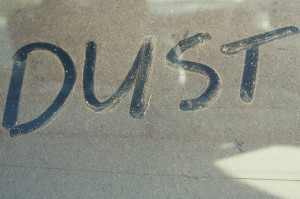When I was in seminary, I pastored Pecan Grove Baptist Church, which was outside of Gatesville, Texas. To be more specific, the little white church sat next to a creek off of FM  107 between Oglesby and Mound. Now you know right where it was, or is—it’s still there. When I went drove down from Fort Worth on the weekends, I stayed with Alene and J. T. Davidson. My brother was the music minister at Live Oak Baptist, which was further up FM 107 as it came into town. On the weekends he stayed with a man named Mike Poston. One Saturday afternoon I went up to visit my brother and Miller introduced me to Mike. When I asked him if he knew J. T. he said, “Know him! I help carry the dirt to make him.”
107 between Oglesby and Mound. Now you know right where it was, or is—it’s still there. When I went drove down from Fort Worth on the weekends, I stayed with Alene and J. T. Davidson. My brother was the music minister at Live Oak Baptist, which was further up FM 107 as it came into town. On the weekends he stayed with a man named Mike Poston. One Saturday afternoon I went up to visit my brother and Miller introduced me to Mike. When I asked him if he knew J. T. he said, “Know him! I help carry the dirt to make him.”
The story came to mind this evening as I read Ragan Courtney’s story about his experience as a young pastor on Ash Wednesday when he blurted out at the first one to come forward, “YOU CAME FROM DIRT AND YOU ARE GOING BACK TO DIRT.” I smiled along with him at the scene because it was not what he meant to say.
Dust, not dirt. We came from dust and to dust we shall return.
Dirt: any foul or filthy substance, as mud, grime, or excrement; earth or soil, especially when loose; something or someone vile, mean, or worthless; moral filth; vileness; corruption.
Dust: dry fine powdery material, such as particles of dirt, earth or pollen; a cloud of such fine particles; the powdery particles to which something is thought to be reduced by death, decay, or disintegration.
Though we may use variants of these words interchangeably, they are not theological synonyms. When we bow our heads and feel the thumb of the minister mark the sign of the cross in ash on our brows, the point of saying we are dust is to remind us of our impermanence, not our worthlessness. The dust, once infused with the imaginative love of God, sprang into being. We are born of love, and to love we shall return—that’s the larger story. Before there was any dust to form, there was Love. After all we know is gone and the universe has been swept clean, there will be Love. From Love we have come and to Love we shall return, dust and all.
Down the fifteen or sixteen millennia that Lent has been observed in one form or fashion, it has been accompanied by a lot of theology intended to remind us we are fundamentally flawed. We do not only sin, we are sinful. Damaged goods, almost from the start. Too easily, then, Lent becomes the season where we try to shed ourselves of what shackles us, hoping that our giving up will make us feel less like dirt. We are preparing for the Resurrection, for what can breathe new life into our tired bones and offer us hope beyond these dusty days. To focus on how we can shed ourselves on what shackles us is a good thing, but our worth as human beings is not at stake. We are wonderfully and uniquely created in the image of God and worthy to be loved. Period.
“To repent,” said Frederick Buechner, “is to come to your senses. It is not so much something you do as something that happens. True repentance spends less time looking at the past and saying, “I’m sorry,” than to the future and saying, ‘Wow!’”
We are dust, not dirt. We are temporary, more than tainted. We are beginning of focus not flagellation. Over these next few weeks, we are making room, creating space in our lives to acknowledge our griefs and losses alongside of our hopes and dreams. Life has not turned out as we expected, for most of us. Grief has become a primary color. We are in need of forgiveness for things we have done and left undone. And we walk these forty-odd days on our way to the Resurrection to allow the Spirit room to remind us we are more than dust: we are children of God.
I have always been drawn to John’s description of Jesus as he prepared to wash the feet of the disciples. He says, “Knowing he had come from God and was going to God, Jesus took a towel and washed the feet of his disciples.” I imagine that John knew Ecclesiastes 12:7—“and the dust returns to the earth as it was, and the breath returns to God who gave it—and I wonder if he was not illuminating a wider arc. Beyond the scope of dust to dust, there is God to God, Love to Love: the One who imagined us and breathed us into being is the One to whom we belong and shall return.
Dust, not dirt. Loved, not lost.
Peace,
Milton

Yes. That’s the only word on my tongue right now. “Acknowledging our griefs and losses alongside our hopes and our dreams.” God’s presence with us, belief in our goodness, and joyous hope for us.
Making room for God. That’s my Lenten work. Thank you, Milton.
Amen and thank you, Milton. It’s a blessing to have your voice through Lent again.
While “grief has become a primary color,” I am grateful not only for a chance to acknowledge it, but also to celebrate that Easter is coming. Thanks fellow traveler; you do not walk alone. Love you bunches.
Thank you.
Yes. You are very articulate and inspiring to me.